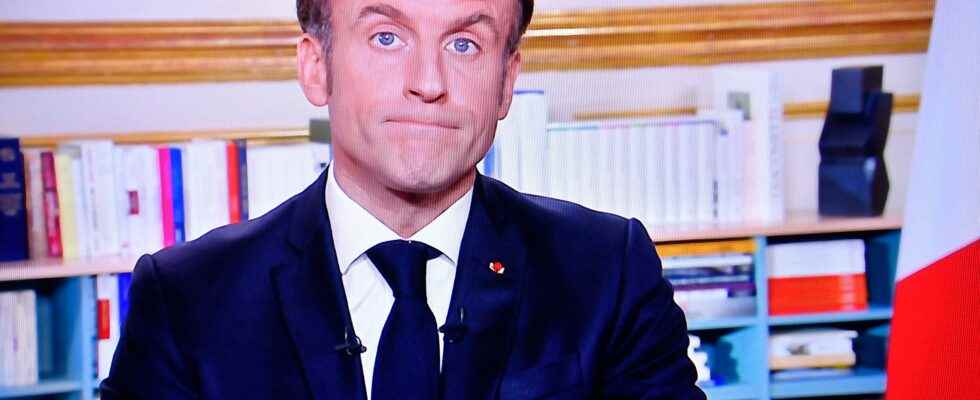Here is a curious and daring pirouette. It is better to be endowed with a certain agility, coupled with a certain assurance, to execute it. This is pretty good for him, Emmanuel Macron has been showing for almost six years now that he has both; and he proved it once again on December 31. How, for a political leader, to combine the insurmountable uncertainty of the future and the need to see it crowned with success? Quite simply, by saying it, of course. Neat and tidy.
“The vow ceremonies have this singularity: they force us to talk about a future that in truth, we do not know”, launched, in the preamble to his speech, the President of the Republic to the 10 million of his fellow citizens who were in front of their television set on Saturday at 8 p.m. A phrase, to say the least tautological, which amused some of those who practiced it very closely. “It’s a form of detachment, of stepping back on himself, quite innovative as far as he is concerned”, deciphers one of his former collaborators at the Château.
The French people know how to resist crises
And yet, via several rhetorical questions – “Are there going to be power outages?” ; “Will there be increases in the price of energy?” ; “Do we have to work longer?” – and a brand new diptych repeated many times – “It is through our work and our commitment…” – the Head of State spent most of this sixth end-of-year speech demonstrating by a + b that it is inscribed in the DNA of this French people that they know how to resist crises. Better , that he will be able to do it More than ever, Emmanuel Macron embraces only one objective, between course to give and Coué method: that his words are performative.
This is the whole difficulty of this new batch of wishes: they are not pronounced in times of acute crisis, as was the case during the peak of the Covid pandemic, nor are they intended to remain in history. , as are sometimes those declaimed with lyricism at the end of the mandate. They are hybrids, because the worst may be yet to come. For the country, which will see state aid dwindle and rebates at the pump disappear; as for the President of the Republic himself, who plays a large part of his five-year term over the next six months. “Renewable energies, pensions, immigration, end of life, reform of institutions… We are climbing 2023 by the north face of the Grandes Jorasses!”, summarizes the president of the Renaissance group in the Senate François Patriat, never short of good formulas.
While on previous New Year’s Eve, with his small team, Emmanuel Macron tried to identify some major themes in his speech, this year he chose to address everything, or almost: immigration, education, army, disability, World Cup rugby, Notre-Dame de Paris, ecology, institutions… At the risk of being too expeditious, even repetitive. With the ambition, at a minimum, to square its mandate. “There is a fundamental issue for him, which is that the ambition for transformation remains intact. And only one valid question: does this five-year term fall into the hands of a noisy Assembly that is more polarized every day? ; or do we still manage to continue the reforms?”, deciphers a full-time minister.
The “mother” of them, that of pensions, is the most glaring example. “Obviously this reform has a parametric dimension, but it is for the benefit of progress, it is up to us to embody that”, explained the Minister of Public Service Stanislas Guerini a few days before this change of year. Emmanuel Macron, for his part, preferred to emphasize above all the safeguarding of the financial balance of the system as the first priority. To better affirm that it is, in 2023, an obligatory passage.
What if the pension reform ended with a 49.3?
We knew that any president of the Fifth Republic is quick to anticipate the decisions taken by the two chambers of Parliament. In November, Emmanuel Macron announced the day before the examination of a bill headed by the Insoumis Aymeric Caron banning bullfighting that there would be no ban. The art of making the legislative power a tad… less powerful. Rebelote this December 31, where the Head of State assures that “this year will be that of a pension reform”, while uncertainty reigns in the National Assembly and in the ranks of the Republicans, divided between several lines. As if, in the end, everything was going to be back to normal through the intervention of the Gaullian Holy Spirit. Unless… Unless the peremptory tone of the President of the Republic confirms what we already imagined: that the pension reform will indeed have as its legislative vehicle an amending social security finance bill, allowing a recourse to Article 49.3 while keeping a cartridge under the elbow for another non-budgetary text. No one would fall from their chair: for several weeks, this has been the preferred option of the executive, according to several members of the government and deputies familiar with the matter. “It may be, for the specialists, the hidden ad of these wishes”, slips a relative of the tenant of the Elysée.
As often, this traditional address to the French did not have much of a moment of truth, unlike what will shake the country from mid-January. Faced with anticipated social movements, the fatigue of the French people mentioned every day by members of the government or, worse, the feared spontaneous mobilizations to the top of the state, this call for unity lives only for a moment. But in politics, it’s a golden rule, it’s always better by saying it.
